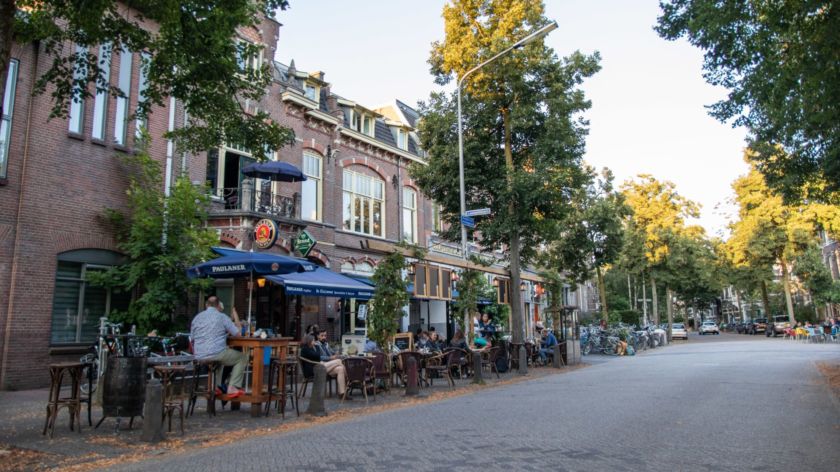Landlords ask (too much) extra rent because of higher energy prices
-
 Bottendaal is one of Nijmegen’s neighbourhoods with lots of student accommodation. The student houses in the photo are not the ones in the article. Photo: Rein Wieringa
Bottendaal is one of Nijmegen’s neighbourhoods with lots of student accommodation. The student houses in the photo are not the ones in the article. Photo: Rein Wieringa
Because of the rise in energy prices, some students pay more than 50 euros extra rent. Students in badly maintained building are often the victim. ‘We pay heating costs, but all heat escapes almost immediately.’
Last January, the 23-year-old student Mo Quirijnen received an unpleasant surprise in the form of a 50 euros increase in rent. His rent increased from 435 to 480 euros per month, on top of the regular rent increase of 5 euros that had just been implemented.
He lives in a large residential complex on the Van Oldenbarneveltstraat, that is owned privately but rented out by a foundation. In January, all residents received a letter sent by the foundation talking about the increase in rent. ‘A friend even has to pay 70 euros more.’
Gas crisis
Quirijnen is not the only student seeing an increase in rent. Last fall, energy prices rapidly increased because of the gas crisis. Because of that, the energy bill for a lot of households became a lot higher this year. That is especially the case for badly insulated housing, such as a lot of student houses.
A student that wants to remain anonymous lives in a student complex on the Bijleveldsingel. Halfway through last January she received an email about the rent per the 1st of February. The landlord wrote that the gas price was going to increase for 27 cents per m3 to 78 cents per m3. ‘I had heard the prices would increase, but I was shocked that my monthly rent would increase by 23 euros,’ says the student. ‘Everyone went ballistic in our group chat.’
‘Sometimes I feel the wind blow in my room’
The big increase also has, according to the anonymous student, something to do with the bad insulation. ‘Sometimes I feel the wind blow in my room, right through the window. And we also pay for the communal areas. The stairwell is heated according to the landlord, but I have my doubts. A while back five windows were smashed. Meanwhile we pay the heating costs, while all heat escapes almost immediately.’
Residents on the Van Oldenbarneveltstraat asked the landlord to lower the increase in rent, says Quirijnen. ‘But he refuses. Only the bare minimum of structural maintenance is carried out, it’s badly insulated. Some people have to turn up the heating real high just to be warm.’
Dependent on the landlord
The heating in the upstairs apartment that the 23-year-old Naomi (surname known to the editors) shares with four roommates is also constantly turned up high. ‘Our house is badly insulated and has single panes of glass in the windows, so there is a lot of energy to be saved. But our landlord often doesn’t react when we ask questions about that.’
Students don’t profit from compensation arrangement for energy costs
The government compensation for energy prices is often useless to students, became apparent last week. Last year, the government made 150 million euros available to households living in ‘energy poverty’. But residents of large housing complexes often do not profit from the discounts on energy taxes, because their independent living space does not have an own energy connection. Households with a low income also receive a one-time compensation of 200 euros for the energy bill. Whether students qualify for this is still uncertain.
The students pay the landlord basic rent and had to sign their own energy contract. That bill has now increased by 180 euros per month. Together with her roommates, Naomi tries everything to keep the energy bill as low as possible, but they can’t influence everything. ‘We are dependent on our landlord and are not allowed to install another boiler or double paned glass.’
Not transparent
With houses where the energy costs are included in the rent, it’s not always clear how the new rent is calculated. Mo Quirijnen: ‘I am afraid they might use the energy prices as a disguised increase in rent, without us being able to see whether those extra costs are actually used to pay for energy. There are agreements on the maximum amount of rent, but gas, water and service costs are not included. That is exactly what the rent increase is based on.’
In his house, the amount of extra rent you’re paying is dependent on the room size. ‘But they don’t take into consideration whether your windows are single of double paned. The person living in my previous room (in the same house, ed.) only pays 25 euros per month extra, while his windows are single paned and mine are double. He needs a lot more heating.’
Extra loans
In a letter, the landlord at the Bijleveldsingel writes that he calculated 65 percent of the increase per room based on the number of square meters. The rest is equally divided for the communal areas. But that explanation doesn’t work, according to the anonymous student. ‘My rent was increased by 23 euros per month, while a roommate with a much larger room only has to pay 13 euros more.’
The student doesn’t dare to complain to her landlord. ‘Often very little happens, so it won’t do much. If I complain, they might be less inclined to help me if something needs fixing in my room.’ To be able to pay the rent, she is going to increase her student loan. ‘My loan covered everything perfectly, but I now need to increase it by 23 euros per month. That is a lot of extra money to have to pay back in the future.’
Help from Huurteams
Huurteams Nijmegen offers legal help to tenants, for example when in conflict with the landlord. Director Irene van Setten often gets the question whether the landlord is allowed to have tenants pay for extra energy costs. ‘It is possible,’ she says. ‘But the landlord has to be able to show what costs were actually incurred. That is done in an annual report. But many landlords never make such a report but do increase the rent right now. That is not allowed.’
Every room needs such an annual report, according to the legal expert. ‘Landlords sometimes hide behind the fact there is only one electricity meter, but there are calculation models for this exact purpose.’
‘We can still demand a settlement from the landlord via the Rent Tribunal’
She thinks some owners try to profit from the current situation. ‘Students already take into account that the energy prices are rising. But how much exactly, fluctuates a lot. A landlord might also increase the rent with the idea: students will surely understand, and I make some extra money.’
If there is no comprehensible annual report, Huurteams can help, says Van Setten. ‘We can still demand a settlement from the landlord via the Rental Committee. That is often quite profitable. And if the energy prices go down again, we need to be aware: the rent needs to come back down as well.’
To conclude, the director emphasizes that a landlord is responsible for fixing defects in a house. A boiler older than 20 years needs to be replaced and those living in a house with broken windows can get a rent decrease. Installing double paned windows on the other hand is part of home improvement and can lead to a higher rent.




